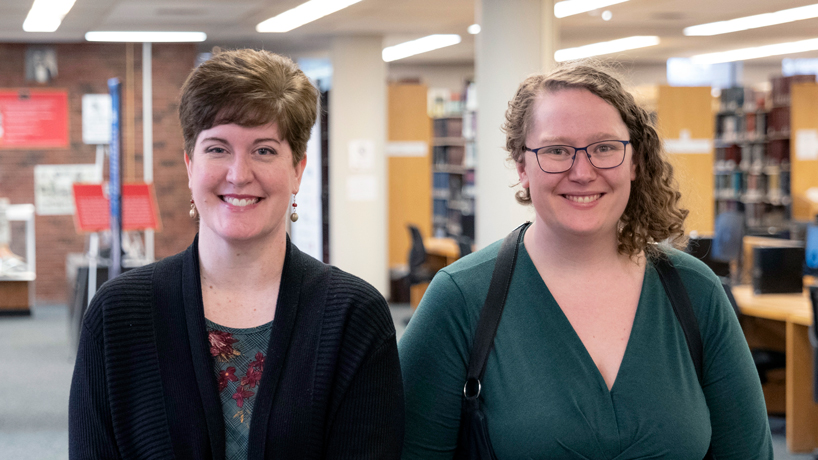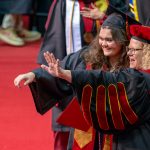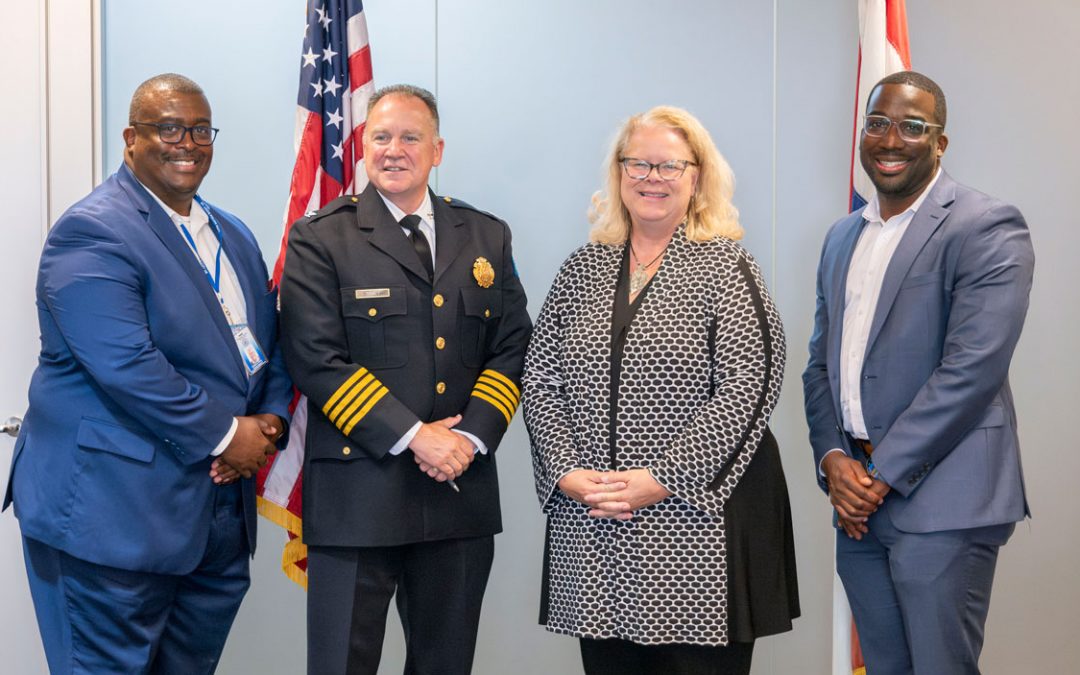
Judy Schmitt (left), reference librarian at University Libraries, and Lena Marvin, the institutional repository librarian at University Libraries, are working to promote and provide expanded access to OERs at UMSL. The effort is part of the University of Missouri System’s Affordable & Open Educational Initiative, which aims to encourage innovative and less costly ways to deliver learning materials to students. Recently, Marvin and Schmitt helped create an updated version of one such resource, an immensely popular open textbook titled “An Introduction to Statistics in Psychological Sciences.” (Photo by August Jennewein)
Lena Marvin, a reference and the institutional repository librarian for University Libraries at the University of Missouri–St. Louis, knew exactly what to do when a student came to her with a unique dilemma.
He had learned calculus in his first language, Spanish, but he needed to learn it in English to keep up with his math classes.
“I was like, ‘Oh, well, here’s an entire calculus book. You can have the whole thing online. It has interactive elements. It’s all there,’” Marvin said. “That made me feel happy.”
What Marvin provided is what’s known as an open educational resource. OERs are educational resources that are licensed to permit cost-free use and repurposing by others. OERs can be texts or textbooks, but they are also datasets, games, lectures, lesson plans, videos and even interactive educational materials.
Marvin, along with reference librarian Judy Schmitt, is working to promote and provide expanded access to OERs at UMSL. The effort is part of the University of Missouri System’s Affordable & Open Educational Initiative, which aims to encourage innovative and less costly ways to deliver learning materials to students.
To that end, the university has launched a new landing page that collects OERs created for use at UMSL and general information on the topic. Recently, Marvin and Schmitt helped create an updated version of one such resource, an immensely popular open textbook titled “An Introduction to Statistics in Psychological Sciences.”
“It’s only been out since December 2021, and it’s over 700 downloads, which is pretty fast for a statistics textbook,” Marvin said.
Additionally, she noted that the university now has access to Pressbooks, a web tool that makes creating OERs like “An Introduction to Statistics in Psychological Sciences” much simpler, so even a busy professor could do it.
Open-source knowledge and learning isn’t a new concept, but the OER movement really started gaining traction at the turn of the century with the Massachusetts Institute of Technology’s OpenCourseWare and Connexions projects. Since then, the benefits to educators and students have become clear, and Marvin is encouraging UMSL faculty members and students to leverage them.
For faculty members, one of the key advantages is the ability to customize course materials. They can take the best parts of multiple texts and combine them to create something 100% relevant for a particular course.
Pressbooks makes that process significantly easier, too. The tool provides a simple interface to rearrange content from disparate sources and create a digital OER with a dedicated web page. Users can also add links and include multimedia elements such as videos. Marvin said it makes for a more intuitive and visually appealing piece of content.
By creating an open, easily accessible textbook, it also encourages collaboration with other academics and allows students beyond a single classroom to augment their studies.
“It’s both the ability to customize and also to share and build on it with other people who are interested in doing that – academia on the shoulders of giants and all that,” Marvin said. “You help your students, but you can also help all students in the world who might want to use the resource.”
For students, free resources are especially useful at time when textbook prices have increased by more than 1,000% since the 1970s and nearly 66% of students will avoid buying course materials when possible due to steep prices. It’s particularly beneficial at UMSL, where nearly half of all undergraduate students each year are Pell Grant-eligible or have excessive financial needs as defined by their expected family contribution.
Online OERs are also far more accessible to students.
“I do know that professors have struggles with their course materials,” she said. “What’s nice about the open stuff, it’s immediately accessible and you don’t have to wait for someone to get their textbook. Students being able to get to it immediately means that you don’t have students trying to share textbooks. You don’t have students trying to use old textbooks. You don’t have students trying to pirate textbooks. You don’t have students having to buy and wait to get their textbook. It’s just in there immediately.”
Marvin is enthusiastic about expanding OER usage at UMSL and is ready to answer any questions about the subject.
“Any professor who’s interested should email me,” she said. “I’m right there for them.”
In addition to the OER initiative, the library has increased programming with events and workshops on topics including citations, digital credibility and library research. You can find those at https://umsl.libcal.com/.
On Tuesday March 9, the library is hosting a Zoom event at 2:30 p.m. entitled “Open Education Superstars,” with UMSL OER “superstar professors” and librarians who have crafted and taught with OER. Faculty and students who are interested are welcome to join in and learn more at http://oer.umsl.edu.
For more information email Marvin at marvinh@umsl.edu or irl@umsl.edu














